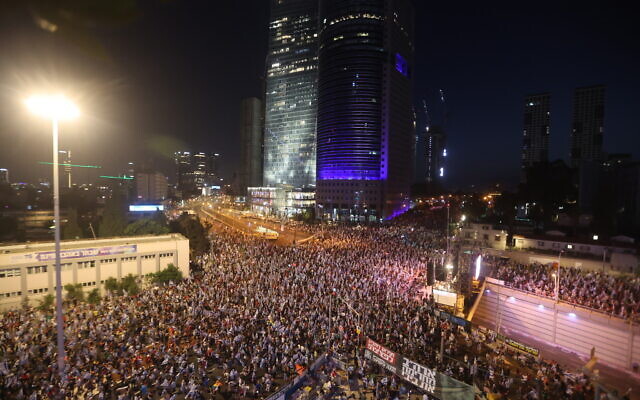Weekly protests against the government’s intention to overhaul the justice system took place for the 23rd week in a row Saturday night, days ahead of a crucial Knesset vote on the makeup of the key Judicial Selection Committee.
Israeli television estimated that between 74,000 and 80,000 attended the main rally on Kaplan Street in Tel Aviv, while organizers claimed around 100,000, alongside thousands of others in some 150 locations around the country, kicking off the 23rd week of regular protests against the currently suspended government plan. Last week’s Tel Aviv rally drew an estimated 95,000-140,000 people, and previous weeks saw some 200,000 people gather.
Many of the night’s demonstrations, including in Tel Aviv, began with a silent commemoration for the latest victims of a spiraling crime wave in the Arab community, which has claimed the lives of 102 people since the beginning of the year, ten in just the past three days.
During the main rally at Kaplan Street, protesters held signs reading “dead-class citizen,” which in Hebrew sounds similar to “second-class citizen,” in reference to the Arab community.
After the scheduled speeches were over, a small group of demonstrators headed to the Ayalon Highway and briefly blocked southbound traffic on the city’s main thoroughfare. Police cleared the protesters after a short while.
In Haifa, former prime minister Ehud Barak called for a non-violent civil uprising against the government.
“We are determined and we will save democracy. [Prime Minister Benjamin] Netanyahu understands that if he tries again to [pass the overhaul], he will run into an iron wall,” Barak said.
“We haven’t won the battle yet. This is not the time for a time-out. We must not fall into illusions. We must intensify the protest and end the negotiations immediately,” Barak said, referring to ongoing coalition-opposition compromise talks under the auspices of President Isaac Herzog.
“The protest must intensify and move into a civil uprising. Non-violent civil disobedience,” he added.
Hungarian protest leader Katalin Törley spoke at a protest in Modiin and likened the erosion of democracy in her home country to what Israeli protesters warn the government is trying to do in the Jewish state.
“Almost one million of the 10 million Hungarians left Hungary,” she said. “Many grandparents only see their grandchildren on a screen. Orban’s relatives and friends win government tenders, and food prices have increased by more than 40 percent in the past year. Do not let that happen to you.”
Törley noted multiple areas in which civil liberties in Hungary have taken a hit under Prime Minister Viktor Orban — academic freedom, public health, public education, women’s rights, protest rights and more — and said that for years, public protests drew only specific sectors harmed by certain measures.
“Here I see many colors together: I see you protesting together with red, blue, green and many other t-shirts. Keep it up — solidarity is your strength. Don’t let the power turn you against each other,” she said.
“I have been participating as an activist in the protests for more than seven years, and the situation is getting worse, more hopeless. It’s a fair question to ask why I haven’t given up yet. My answer is simple: for me, protesting and standing up for my professional and human dignity is a moral issue… You should not only look at the immediate results, and not only at your goals. The most important thing is to maintain self-dignity and pride and to set an example.”
On Wednesday, the Knesset will vote to appoint two lawmakers to the nine-member Judicial Selection Committee, which is chaired by Justice Minister Yariv Levin of Likud. The coalition has threatened to take both spots on the panel, breaking with tradition.
Opposition leaders have said that if the coalition does so, it will signal the end of the compromise talks.

The makeup of the judicial selection panel is central to the coalition’s ongoing efforts to greatly increase political control over the judiciary. A key bill in the overhaul plan would reshape the committee and hand the government an automatic majority, giving it the power to determine most judicial appointments.
That bill is on the cusp of being passed into law, and can be brought for its final, back-to-back votes in the Knesset plenum at a moment’s notice. However, such action is almost sure to lead to a resumption of intense public opposition, as was seen before the legislation was frozen.
The judicial overhaul legislation has been frozen since late March, when Netanyahu said he would halt the plans to allow for talks with the opposition, aimed at finding a broadly accepted compromise for judicial reform.
But months of talks have not produced a breakthrough, and pressure has increased within the coalition to resume the legislative push.

Netanyahu said last month, following the passage of the state budget, that “of course” the overhaul was now back on the government’s agenda. Later that day, however, he added: “We will of course continue with our efforts to arrive at a broad consensus agreement, to the extent possible, on the issue of judicial reform.”
Critics say the overhaul will sap the High Court of Justice of its power to act as a check and balance against parliament, eroding Israel’s democratic character and leaving minorities unprotected. Supporters say the legislation is needed to rein in what they see as an over-intrusive court system.




